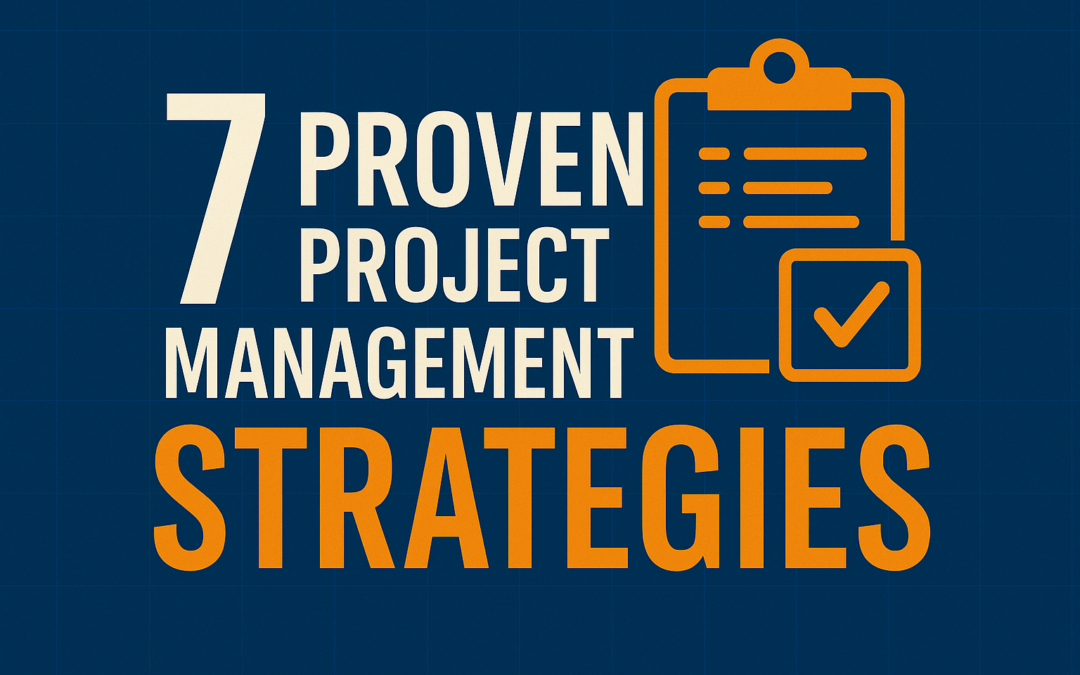Table of Contents
Highlights (Quick Scan):
-
Learn 7 essential strategies used by top-performing project managers worldwide.
-
Discover how communication, leadership, planning, and risk management are evolving in the AI-driven workplace.
-
Includes FAQs, updated 2025 insights, and practical takeaways for corporate teams.
Introduction: From Vision to Execution
“A vision without a strategy remains an illusion.” — Lee Bolman
Modern organizations face tighter deadlines, shifting stakeholder demands, and global teams spread across time zones. Having goals is not enough — success depends on strategies that transform vision into outcomes. In today’s hybrid, AI-driven world, project managers are no longer just task coordinators; they are strategic leaders who align business value with delivery.
At PM Training School, we see this first-hand in corporate training: the project managers who rise fastest are those who master seven core strategies. Let’s explore them.
1. Influential Communication: Beyond Status Updates
“Priorities and plans may change, deadlines may slip, but communication must stay consistent.” — Liz Helbock
Effective communication is the lifeline of modern projects. It’s not just about reporting; it’s about alignment and trust.
-
With clients: transparent updates prevent surprises and build credibility.
-
With teams: clarity reduces rework, boosts morale, and enables collaboration.
-
With executives: structured reporting ensures continued sponsorship support.
Tools in 2025: AI-powered dashboards (e.g., ClickUp, Jira, MS Project), collaborative platforms (Miro, Teams), and structured reporting templates.
2. Understanding Stakeholder Objectives
“I don’t begin a project until I fully understand it.” — Michiko Diby
A project manager must dig deep into the “why” behind the project. This means not just listening to sponsors, but clarifying assumptions and challenging unrealistic expectations.
Pro tip: Use frameworks like OKRs (Objectives & Key Results) or Project Charters to document and validate client objectives before execution.
3. Efficient Leadership: From Command to Empowerment
“A leader is best when people barely know he exists.” — Lao Tzu
Leadership today is not command-and-control; it’s about creating conditions for teams to thrive.
-
Set a clear vision and align it with business strategy.
-
Motivate by coaching, not ordering.
-
Enable autonomy while ensuring accountability.
In 2025, distributed teams demand digital-first leadership: leveraging asynchronous updates, respecting diverse cultures, and balancing productivity with well-being.
4. Comprehensive Planning: The Backbone of Delivery
“Planning is bringing the future into the present.” — Alan Lakein
Planning is often undervalued, yet it’s what separates struggling managers from strategic leaders. Strong project planning involves:
-
Mapping dependencies with Gantt or Kanban systems.
-
Building in flexibility for change (Agile sprints, hybrid delivery).
-
Ongoing monitoring with Earned Value Management (EVM) or velocity metrics.
Visual Idea: Infographic comparing Waterfall vs Agile vs Hybrid planning approaches.
5. Time Management: Guarding the Scarcest Resource
Time is the one resource you can’t replace. For project managers, effective time management means:
-
Delegating smartly (avoid bottlenecking).
-
Protecting focus time for strategic work.
-
Saying no when scope creep threatens delivery.
-
Using tools like time-boxing or the Pomodoro method for personal productivity.
Respecting your team’s time also builds trust and prevents burnout — a critical factor in global project success.
6. Adept Negotiation: Finding Win–Win in Complexity
“Knowing how to negotiate well so that all parties are satisfied is a key skill.” — Cesar Abeid
Project managers negotiate daily: budgets, timelines, resources, vendor contracts, even team roles. Strong negotiation means:
-
Understanding underlying interests (not just stated demands).
-
Offering trade-offs that preserve project value.
-
Managing conflicts without escalating politics.
Framework Idea (Table):
Negotiation Area
Budget
score
Resources
Common Challenge
Competing priorities
Score Creep
Overlap/shortage
Winning Tactics
Link spend to business ROI
Define change control early
Cross-train, share capacity
7. Risk Management: Expecting the Unexpected
Every project carries risk, but not every project manager manages it well. In 2025, proactive risk management is a board-level priority.
Key practices:
-
Identify risks early (using brainstorming, SWOT, or AI-driven risk prediction tools).
-
Maintain a living Risk Register.
-
Communicate openly about risks with sponsors — avoid surprises.
-
Balance mitigation and contingency planning.
Projects succeed not by eliminating risk, but by anticipating and adapting.
FAQ: Project Management Skills in 2025
Q1. What’s the most important skill for project managers today?
Influential communication — because it underpins leadership, negotiation, and stakeholder management.
Q2. How is project management changing with AI?
AI is streamlining reporting, scheduling, and risk prediction, freeing project managers to focus on strategic alignment and human leadership.
Q3. Do project managers still need traditional tools like Gantt charts?
Yes, but combined with Agile boards, dashboards, and hybrid planning. The key is adaptability.
Q4. How do corporate buyers benefit from project management training?
Training ensures teams deliver consistent results, reduce project failure rates, and align with global best practices (PMI, PRINCE2, Agile).
Conclusion: Strategy Turns Vision into Reality
Great projects don’t succeed by accident. They succeed because skilled project managers use proven strategies: they communicate, understand stakeholders, lead, plan, manage time, negotiate, and mitigate risks.
In the age of hybrid work and AI, these seven strategies remain the foundation of project excellence.
👉 Follow PM Training School on LinkedIn for more insights on project management and corporate training.



Recent Comments